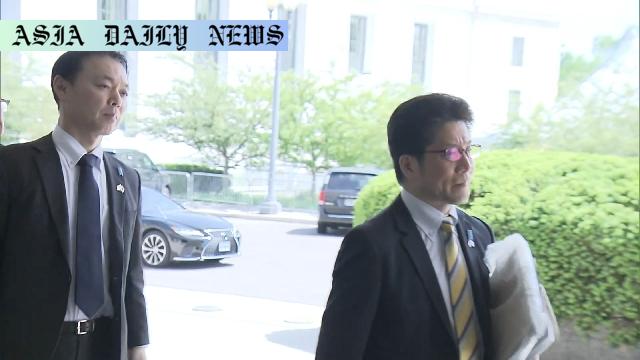Japanese abductees’ families highlight urgent need for US-Japan collaboration to resolve long-standing abduction issue by North Korea.

Significance of North Korean Abductions Issue
The abduction of Japanese nationals by North Korea remains one of the most painful and unresolved human rights issues for Japan. In the 1970s and 1980s, North Korean agents abducted 17 officially recognized Japanese citizens, disrupting lives and creating a deep scar in the relationships between the affected families. While five abductees returned to Japan after the Japan-North Korea summit in 2002, 12 individuals remain unaccounted for. Families of the abductees have been working tirelessly for decades, seeking justice and the safe return of their loved ones, with little progress in negotiations over the years. This issue is not just about the missing individuals; it represents a diplomatic challenge, a violation of human rights, and an emotional strain for the families involved.
Meeting with US Officials: A Ray of Hope
In a bid to escalate their efforts, two prominent relatives of the abductees, Yokota Takuya and Iizuka Koichiro, along with their supporters, recently met US Deputy Secretary of State Christopher Landau in Washington. Takuya, younger brother of Yokota Megumi, who was abducted at the age of 13, and Iizuka, whose mother Taguchi Yaeko was taken when he was only a year old, represented the voices of the affected families in their 30-minute meeting. They emphasized the urgency of the situation, as many parents and loved ones of the abductees are aging, with some passing away without closure. The delegation reminded the US officials about Yokota Sakie, the only surviving parent of the remaining abductees, signifying the emotional gravity of time running out. Yokota Takuya expressed optimism after the meeting, asserting the fruitful discussions and efforts that could reignite support for resolving this prolonged issue.
US Commitment to the Cause
The US Department of State reaffirmed its unwavering support for Japan’s efforts and acknowledged the emotional toll this issue has taken on the families. During the meeting, Christopher Landau extended his condolences to Arimoto Akihiro, the father of abductee Keiko Arimoto, who passed away earlier this year without reuniting with his daughter. The officials also assured the relatives that this issue is receiving due attention under the Biden administration. Historically, the United States had addressed this matter during the Trump administration, with then-President Donald Trump urging North Korean leader Kim Jong Un to engage on the abductions issue during summits. Relatives hope that this momentum continues and that the abduction issue is raised in future diplomatic discussions between the US and North Korea.
Challenges Ahead
The challenges in addressing the Japanese abductees issue remain substantial. Despite international pressure, North Korea has maintained a dismissive stance on the matter, often denying the existence of unresolved abduction cases. The political dynamics between Japan, the US, and North Korea further complicate a straightforward resolution. Relatives of abductees are advocating for a more coordinated approach between Japan and the United States in pressuring North Korea into cooperation. With speculation about possible US-North Korea discussions in the near future, families of the abductees fear losing the opportunity to bring closure to this devastating chapter of their lives if action is delayed further. Diplomats and family advocates must navigate these challenges with strategic persistence and compassion.
Conclusion: A Path Forward
The meeting between the relatives of Japanese abductees and US officials signifies a unified determination to resolve this human rights issue. The collaboration underscores the shared values of humanity and justice between Japan and the US. As families and their aging members grow more anxious over time, the urgency of this matter cannot be overstated. Sustained diplomatic negotiations, international pressure, and public awareness are essential tools in seeking justice for the victims and returning them to their families. This long-standing issue serves as a reminder of the resilience of the human spirit and the power of collaboration in addressing profound challenges.
Commentary
A Heartbreaking and Personal Struggle
The plight of Japanese families who have lost their loved ones to North Korean abductions is not just a matter of international diplomacy; it is a deeply personal tragedy. Parents, siblings, and children of abductees have carried the burden of heartbreak and uncertainty for decades. Many of their pleas have gone unanswered, yet their resolve has not wavered. Meeting with US officials is just one more step in their enduring battle for justice. Personally, it’s impossible not to feel moved by their resilience and the urgency of their mission, especially as family members age without a resolution.
Why US-Japan Collaboration Matters
The United States plays an integral role in spotlighting the abduction issue on the global stage. By lending its weight as a diplomatic power, the US has the potential to pressure North Korea and bring new dynamics to the negotiations. However, international collaboration is necessary to change the status quo. Japan and the US must approach this issue with synergy and commitment. Every meeting, like the one recently held with Deputy Secretary of State Christopher Landau, reaffirms the importance of this collaboration and reminds us that the world is watching, hoping for an outcome rooted in compassion and justice.
A Universal Responsibility
The unresolved abductions issue serves as a stark reminder that human rights transcends borders. This is not just a Japanese problem — it’s a global cause that reflects the collective responsibility of nations to safeguard and fight for justice. Supporting these families is not only a matter of diplomatic duty but a moral obligation to right a historic wrong. As observers and participants in this world, we must amplify their voices, offer solidarity, and hope for a resolution that respects democracy and humanity.


